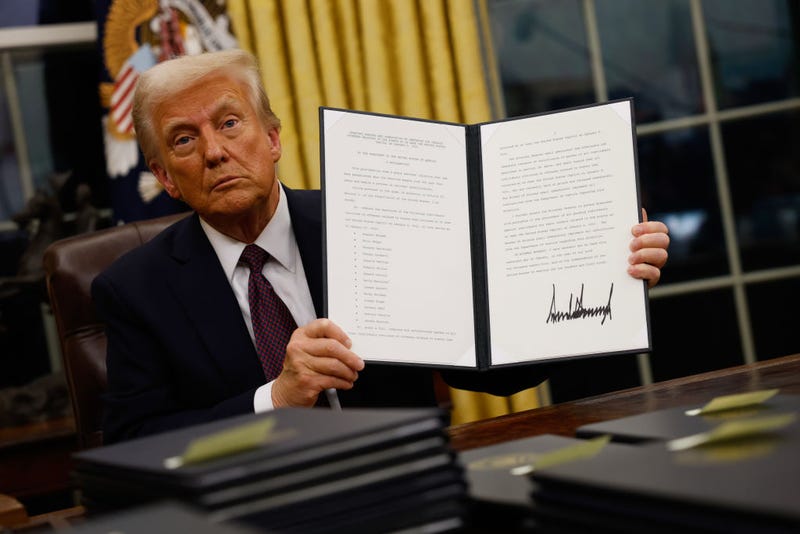
Monday was inauguration day in America, as Donald Trump was sworn in and becomes the 47th President of the United States. It was also a day of a display of unprecedented presidential power, with outgoing President Joe Biden and the incoming presidency of Trump issuing sweeping pardons throughout the day.
First, Biden in one of his last acts as president, pardoned his siblings and their spouses, saying his family had been “subjected to unrelenting attacks and threats, motivated solely by a desire to hurt me — the worst kind of partisan politics.” Then Trump, later in the day, pardoned, commuted the prison sentences or vowed to dismiss the cases of all of the 1,500-plus people charged with crimes in the Jan. 6, 2021, U.S. Capitol riot, including people convicted of assaulting police officers.
"Yesterday was probably the most significant day in the history of the pardon power, just in terms of the different ways it was being used all of a sudden, the preemptive pardons are not something that's totally new," Professor Mark Osler of St. Thomas University says.
Presidents have a wide scope when it comes to pardoning people according to the U.S. Constitution. It's a power that has been used since George Washington issued a pardon as the first president. Osler says this is one power presidents can wield with very little oversight.
"It's a remarkably broad and deep power," Osler told Vineeta Sawkar on the WCCO Morning News. "It's one of the few unchecked powers the president has that really, the only limitation on a president's pardon power is that it can't be for a crime that hasn't yet been committed, and it can't be for someone who's in the process of impeachment. Other than that, they really have a wide scope and that wide scope has certainly been tested with what happened yesterday."
The Trump pardons were at a minimum teased throughout the 2024 campaign. He had been promising to rewrite the history of the Jan. 6th violence at the Capitol after the 2020 Election.
Biden's pardons of family members and others, announced just minutes before the inauguration of Trump, came as a shock to most including former Minnesota Congressman Dean Phillips, speaking to WCCO's Chad Hartman.
"It saddens me to say, but I never thought in our lifetime we would see pardons politicized in the way that they have been in just the past couple years," said Phillips. "Now do I understand why Joe Biden, ultimately as a father, pardoned his son Hunter? Yes, as a father. But not as an American. Do I disagree with pardoning relatives? Absolutely. Do I also disagree with a man like Donald Trump, who threatens our legal, our judicial system, to punish his political enemies? Absolutely. These are both wrongs."
President Trump's pardoning or commuting of the prison sentences in the Jan. 6, 2021, U.S. Capitol riot, do come with a little bit of history on his side Osler explains.
"One thing people misunderstand is that it's not new to grant clemency to insurrectionists," Osler said. "In fact, the very first grant of pardons by George Washington was to people who led the whiskey rebellion in western Pennsylvania. We had President (Andrew) Johnson granting pardons to thousands of Confederates after the Civil War who had been insurrectionists. So that's not new."
Osler says what is new, however, is that in those cases they were people who were opposed to the president and what the president had been doing.
"Here, the different dynamic is that those people were acting on behalf of the person who granted them the pardons and commutations," Osler explained.
Osler adds there are just two ways to change how pardons are handled. One is a Constitutional Amendment, which is very unlikely to happen. The other?
"We elect people and we too rarely pay attention to how they're going to use the pardon power," says Osler, who thinks it needs to be much more of a talking point and factor in Presidential Elections going forward.
Trump’s action, just hours after his return to the White House on Monday, paves the way for the release from prison of people found guilty of violent attacks on police, as well as leaders of far-right extremist groups convicted of failed plots to keep the Republican in power after he lost the 2020 presidential election to Democrat Joe Biden.
The pardons are a culmination of Trump’s yearslong campaign to rewrite the history of the Jan. 6 attack, which left more than 100 police officers injured as the angry mob of Trump supporters — some armed with poles, bats and bear spray — overwhelmed law enforcement, shattered windows and sent lawmakers and aides running into hiding. While pardons were expected, the speed and the scope of the clemency amounted to a stunning dismantling of the Justice Department’s effort to hold participants accountable over what has been described as one of the darkest days in the country’s history.
Trump also ordered the attorney general to seek the dismissal of roughly 450 cases that are pending before judges stemming from the largest investigation in Justice Department history.
